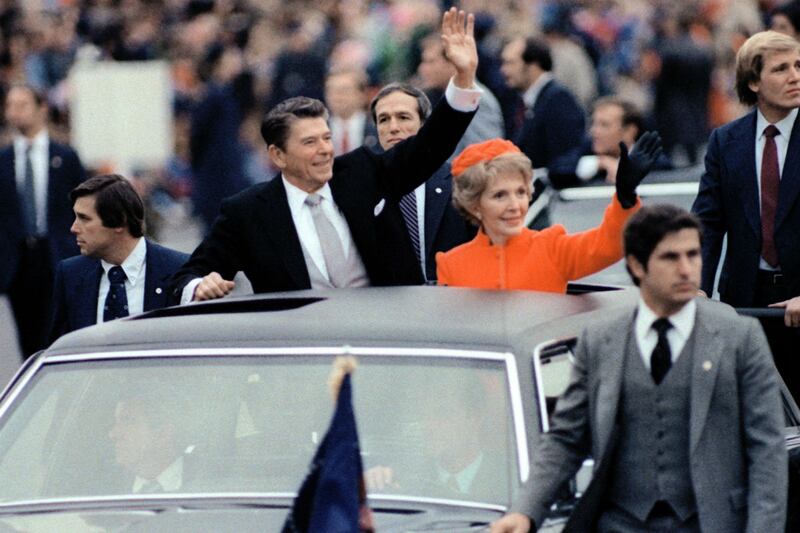
One of the classic conspiracy theories of the 80's and early 90's (before the black helicopters, truthers, and birthers) was the belief that Ronald Reagan's presidential campaign has conspired with the government of Iran to delay the release of American hostages who had been captured during the 1979 revolution.
This theory was written up in a 1992 book by Gary Sick entitled October Surprise. The theory has never gained real legitimacy, and it seems that there are still new holes are being found in it.
The latest hole revolves around Ari Ben-Menashe, a man who described himself as working with Israeli security. As Michael Ledeen wrote in a 1992 review of the book, Ari Ben-Menashe was one of the key sources for Sick:
Sick’s second key source is an Israeli by the name of Ari Ben-Menashe, who has variously described himself as an intelligence officer, a national-security adviser to Israel’s prime minister, and an international arms dealer. Ben-Menashe has claimed, inter alia, that as a member of an Israeli intelligence committee he helped cook the hostage-release deal; that he was present at an October 1980 meeting in Paris at which George Bush (then Reagan’s running mate) met with both Iranian and Israeli officials to seal the deal; and that in payment for the Iranians’ compliance he shipped weapons to Iran for six years.
Ben-Menashe’s seemingly inexhaustible “information” is not limited to the “October Surprise.” He has also alleged that in 1988 Robert Gates, then Deputy Director (now Director) of Central Intelligence, met with the infamous Chilean arms smuggler Carlos Cardoen in Santiago to arrange for shipments of chemical and biological weapons to Iraq. Ben-Menashe further claims that Gates personally received $1.5 million from Israel “to persuade him to discontinue the trade in chemical weapons to Iraq.” These allegations were investigated by the FBI at the time of Gates’s CIA confirmation hearings last year, and were found to be false.
Twenty years later in 2012, Emanuele Ottolenghi has found new problems with this source. It turns out Ben-Menashe invented some of the people he spoke to Sick about:
As it turns out, the Mehdi Kashani described by Ben-Menashe in his conversations with Sick and in his 1992 memoir Profits of War,[10] does not exist. He is a phantom with a life story that casually blends public domain biographical information of two very different, real-life individuals with similar names—Mehdi Kashani, a government official involved in arms procurement, and Seyed Ahmed Kashani, scion to a prominent religious family and himself an Islamist politician—into a single, unlikely narrative. Ben-Menashe's descriptions of the fictional Kashani—his activities, his Iranian regime connections, and his whereabouts—suggest that he was not sufficiently familiar with either of the real life inspirations for his character, or with Iran in general, to detect his mistake. That Sick—by all accounts an intelligent, seasoned observer of the country—carried forth this ruse was not an honest mistake but a willful dereliction of professional ethics.…
Sick acknowledged that there are "dozens of lapses" and "scores of dangling loose ends" in his elaboration of the October Surprise conspiracy.[25] He specifically cautions the reader about Ben-Menashe, "a colorful individual, full of extraordinary tales … [who] cannot be used as a sole source. Everything he says must be independently corroborated."[26]
However, Sick failed to perform such due diligence. The corroboration that apparently led him to put faith in Ben-Menashe's testimony was retroactive.…
There is ample evidence to establish that the real Mehdi Kashani procured weapons for the Iranian regime during the 1980s and dealt with retired Israeli officials involved in the arms trade, making him a plausible participant in the October Surprise conspiracy. However, he bears little resemblance to the man Ben-Menashe purports to know intimately. He was not the scion of a prominent clerical family. Having lived in Spain continuously after 1984, he clearly was not the radical firebrand jailed by the Iranian government in 1986-89. Having worked as an oil ministry official in London prior to that, he could not also have been a sitting member of parliament from 1980-86.
Ben-Menashe's claim that he and Kashani were close friends and partners in the arms trade is not only wholly unsubstantiated but so poorly contrived as to undermine fatally Ben-Menashe's relevance and credibility as a source.




